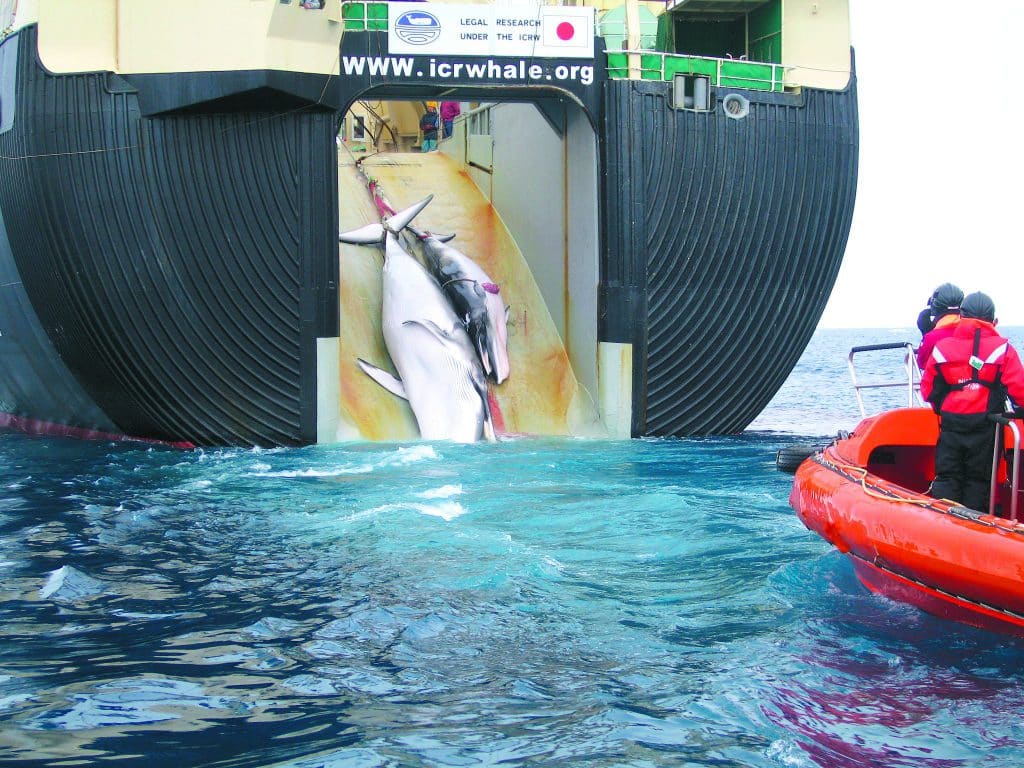Japan brings back whale hunting
5 min read
As of 1 July 2019, Japan has commenced commercial whale hunting
It was 1986 when the International Whaling Committee (IWC) banned hunting after a steady decline in the number of whales seen by hunting in the 19th and early 20th century. All IWC members agreed to a hunting moratorium to allow the whale numbers to recover. But after a 30-year hiatus, it all changed in July this year. In a polarising move, one of the members withdrew from the committee.
Japan—a whaling country like Norway and Iceland—saw its last commercial hunt the year the moratorium was signed. But in reality, it never really stopped whaling. Hundreds of whales were caught annually in the southern ocean for what it says were research missions. And now after three decades, it returned to the waters on 1 July but this time to commercially catch whales by sending its first whaling fleet in the coastal waters—exactly six months after the country announced it would leave the IWC.
The decision came after the IWC voted down Japan’s proposal to resume commercial hunting of whale species that the country says have been recovered.
However, to prevent overhunting, the Fisheries Agency has set a quota of 227 whales—52 minke, 150 Bryde’s, and 25 sei whales—for commercial hunting through late December.
International condemnation

BBC reported that according to IUCN Red List of Threatened Species, minke and Bryde’s whale are not endangered. The numbers of sei whale, although classified as endangered, are increasing. So in terms of numbers, Japan’s commercial whaling may just have a minimal impact.
But that has not stopped conservationists to condemn the country’s move. Groups such as Greenpeace have criticised the government’s decision, calling it a “grave mistake, which is out of step with the rest of the world.”
In a statement released late last year, Sam Annesley, executive director at Greenpeace Japan urged the government to reconsider its decision. He also added that in the past, countries such as the Netherlands have left the IWC but returned.
“Ultimately, the protection of the world’s oceans and marine life needs global cooperation.”
And it is not just conservationist groups demanding Japan to reverse its decision. Earlier this year, in an open letter to the Japanese prime minister Shinzo Abe, celebrities such as Ricky Gervais, Stephen Fry, and Virginia McKenna attacked the country’s decision to leave IWC. The letter stated,
“There is no humane way to kill a whale. Whales die in agony when harpooned, often taking a long time to die in bloody and gory conditions.”
The general public joined in with protests march seen to the Japanese embassy in London. Internationally, governments across the world, including New Zealand’s, strongly opposed Japan’s decision to pull the pin on IWC.
On the other hand, Sea Shepherd—New Zealand’s not-for-profit conservation organisation—saw it as a positive development. In a statement released in December 2018, Captain Paul Watson said that “whaling as a ‘legal’ industry has ended. All that remains is to mop up the pirates.”
He added that they were “delighted to see the end of whaling in the Southern Ocean Whale Sanctuary. We are delighted that we will soon have a South Atlantic Whale Sanctuary and we look forward to continuing to oppose the three remaining pirate whaling nations of Norway, Japan, and Iceland.”
Enthusiasm among whalers

Hunting whale meat are part of Japan’s culture 
But despite international outcry, Japanese whalers made their first commercial kill—a minke off Japan’s northernmost main island of Hokkaido—that was made by a ship based in Minamiboso.
On 1 July, five vessels left Kushiro in northern Japan while three whaling boats left from Shimonoseki in south-western Japan. And two hours later, whalers returned with their kill. In a ritual to purify and celebrate the catch, ceremonial cups of sake were poured over its body by whalers.
“Today is the best day,” Yoshifumi Kai, head of the Japan Small-Type Whaling Association was quoted as saying by The Guardian. “It was worth waiting for 31 years.”
Kai, a fisheries official, added, “This is a small industry, but I am proud of hunting whales. People have hunted whales for more than 400 years in my home town.”
Fishermen from whaling towns of Abashiri, Taiji, Ishinomaki, and Minamiboso will be part of Japan’s whale hunting programme, which will be restricted to the country’s 200-mile zone.
Residents of small whaling towns that saw a decline in their economy after the ban on whaling see Japan’s decision as a welcome change and hope to see more tourists who would want to eat whale meat.
In Japan’s defence, hunting and eating whales are in its culture. So why should anyone ask them to stop it?
Demand for whale meat
International media has widely reported that there has been a decline in the demand for whale meat in Japan.
What was seen as an affordable supply of protein after World War II was eventually replaced by other sources of meat, with the annual consumption dropping from 223,000 tonnes in 1962 (when it had reached its peak) to 6000 tonnes in 1986—the year the moratorium was signed.
Even during its so-called research phase, Japan caught as many as 1200 whales a year, which the wider international community believed, reached restaurant tables. However, the consumption slumped further when international protests escalated, and according to Fisheries Agency officials, today, 4000–5000 tonnes are supplied annually.
With commercial whaling back on the track, will Japan see a rise in consumption again? Only time can tell.
But what seems to be a darker and larger cloud looming across the world is in a time where it is vital for international communities to come together and work towards the betterment of the environment, countries such as Japan are taking a step back and excluding themselves from a global effort. Japan’s decision may have repercussions on countries trying to undo the damage done by humans. After all, protecting the planet’s oceans and the life that thrives in it calls for global cooperation.



